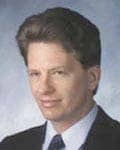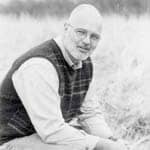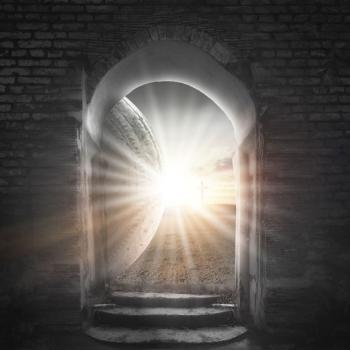By the Cross Examinations Group
 The Cross Examinations series asks pastors, professors, and writers to explore questions of vital importance to the church in a coherent and constructive manner. We hope that reflecting together will stimulate thought, focus conversation, and ultimately prove more edifying to online readers and to the church. Our first installment considered signs of theological renewal amongst evangelical churches, and our second installment examined the relationship between evangelistic and "social justice" ministries.
The Cross Examinations series asks pastors, professors, and writers to explore questions of vital importance to the church in a coherent and constructive manner. We hope that reflecting together will stimulate thought, focus conversation, and ultimately prove more edifying to online readers and to the church. Our first installment considered signs of theological renewal amongst evangelical churches, and our second installment examined the relationship between evangelistic and "social justice" ministries.
The present installment addresses the question:
Evangelicals are often portrayed as homophobic or hateful toward gays. If you could envision the ideal relationship between evangelical churches and gays, what would that relationship look like?
Our contributors this week are:
David Buschart, Professor of Theology and Historical Studies at Denver Seminary
Timothy Dalrymple, Manager of the Evangelical Portal at Patheos
Douglas Groothuis, Professor of Philosophy at Denver Seminary
Tony Jones, prominent speaker/author, and leader in the Emergent Church movement
John March, church planter, pastor, and blogger
Brian McLaren, pastor, Emergent Church leader, and author
David Buschart is Professor of Theology and Historical Studies and Academic Dean at Denver Theological Seminary.
is Professor of Theology and Historical Studies and Academic Dean at Denver Theological Seminary.
Ideally, the relationship would be one of accurate and mutual understanding, interactions marked by civility, and, wherever appropriate and possible, side-by-side participation in enterprises that serve the good of society. The relationship would be grounded in relationships, that is people in direct, first-person relationships with each other, rather than being driven by stereotypes or generalizations based upon what is perceived through the media.
Furthermore, the words and works of evangelical churches would be marked by the love of God in Christ for all people. Evangelical churches would also clearly, accurately, and pastorally teach within the church and, as appropriate, proclaim beyond the church biblical truth as it relates to homosexuality and issues of relevance to homosexuals. Homosexuals would speak about and act toward evangelicals in ways that embody the values and principles that they want to characterize civil society.
This brief response to the question begs many questions, and in seizing upon the word "ideal" some might think that it is evasive or cheeky. It is incomplete, to be sure. As for appearing tongue-in-cheek . . . sometimes we simply need to remind ourselves of the ways in which we have gone astray and the ways in which we need to go.
Back to top
Timothy Dalrymple manages the Evangelical Portal at Patheos.
manages the Evangelical Portal at Patheos.
I often wonder how different the relationship between evangelicals and gays might have been if evangelicals had been the first to respond to the HIV/AIDS crisis, when it began to reach the public consciousness in the 1980s, with relationships and deeds of extravagant love and self-sacrifice. Christians historically have had extraordinary ministries to lepers, even when it was believed that leprosy was contagious. Yet we could not find it within ourselves, when the means of transmission were not fully known, to serve those perishing in the AIDS wards and suffer in solidarity with them. Why? Because we believed (or at least many believed) that the druggies, the prostitutes, and the homosexuals were morally culpable for their suffering. The stigma of associating with such people was great, and a higher price than most Christians were willing to pay.
The point, for the moment, is not whether homosexual acts are against or in accord with the will of God. The point is this: We have much to confess. There is nothing necessarily hateful or bigoted in professing the historically orthodox view regarding homosexuality and marriage. Yet we have failed to imitate Christ in befriending those on the margins, serving those in need, and standing with those who are persecuted. Until we have done these things, until we have performed acts of selfless compassion, until we have fashioned relationships of deep love and respect, even words spoken in love and encouragement will be heard as hateful and judgmental.
When the woman caught in adultery was brought before him, Jesus did not fail to call her life what it was: a life of sin. First, however, he defended her against the ravenous crowd. He did not condemn her; he freed her. There was no need to tell the woman what she already knew. Instead he stood between her and the crowd and reminded everyone else that they were sinners, too. He showed her more grace than she could have thought possible.
Surely it must be possible for those who believe that homosexual deeds are against the will of God to be, nonetheless, profoundly loving and gracious. Jesus did not fail to identify sin as sin, and yet he laid down his life for us while we were yet sinners. If we are truly to be followers of Christ, then we must do the same.
Back to top
Douglas Groothuis is Professor of Philosophy at Denver Theological Seminary, and he blogs at The Constructive Curmudgeon:
is Professor of Philosophy at Denver Theological Seminary, and he blogs at The Constructive Curmudgeon:
The biblical position on homosexuality is rooted in Genesis 1-3, where foundational principles for religion and relationships are laid out. God's designed order for human sexuality is heterosexual monogamy. Male and female are equally called to serve God, love each other, and to develop and cultivate the good earth (Genesis 1-2). But through the fall, humans are alienated from God, from themselves, from each other, and from nature (Genesis 3). It is because of the fall that homosexuality exists; it has no root in creation. The Hebrew theocracy required the death penalty for those convicted of homosexual behavior (and for many other crimes as well). In the New Covenant, the civil laws of Israel are transcended, yet Paul teaches that homosexual activities are the result of sin and rebellion against God (Romans 1:18-32), and warns that those who persist in such activity will not inherit the Kingdom of God (1 Corinthians 6:9). Thus, the theological categories are clear cut. The Bible gives no positive examples of homosexual activity. Rather, homosexual activity is something to repent of, and repentance cannot be subtracted from the Gospel (Matthew 4:17).
Because of the redemptive work of Jesus Christ, any sinner can be justified and forgiven through the atonement of Jesus Christ. (While Jesus did not directly speak about homosexuality [he did not need to, since no loyal Jew would defend it], he did ratify the Genesis pattern of marriage in Matthew 19:1-4.) All guilt, homosexual or otherwise, can be taken away through Christ's finished work on the Cross. As Francis Schaeffer taught in True Spirituality, the justified person can hope to experience "substantial healing" through sanctification. This includes the dimension of sexual sin. Some homosexuals have experienced total deliverance from this orientation through God's healing; others experience more gradual restoration. But in a fallen world, some regenerate people will not find themselves restored to a heterosexual set of desires. In that case, the Christ-follower must submit himself or herself to a life of celibacy for the sake of conscience and in obedience to God and his Word.
While these moral guidelines are clear cut, they do not warrant hatred or bitterness to those affected by homosexuality. The gospel goes out to all sinners, homosexual or otherwise (Acts 17:30). Yet we cannot twist the Scriptures (2 Peter 3:16) to make them endorse homosexuality or same-sex marriage. Christians, in the power of the Holy Spirit, should show compassion toward homosexuals, but this does not include supporting same-sex marriage, which is a violation of the most basic institution ordained by God at creation: heterosexual marriage. Further, in our pluralistic and largely post-Christian culture, the case for heterosexual monogamy can appeal to natural law (Romans 1:24-23; 2:14-15) as well as to special revelation, since heterosexual monogamy is deeply rooted in human nature, as Robert George and others have argued. But if relativism prevails in our culture, even this appeal will become increasingly difficult to make.
Back to top
Tony Jones is a leader in the Emergent Church movement and the author of many books, including The New Christians and The Teaching of the Twelve.The following is drawn from an article Tony wrote for Patheos last year.
is a leader in the Emergent Church movement and the author of many books, including The New Christians and The Teaching of the Twelve.The following is drawn from an article Tony wrote for Patheos last year.
In English, a "shibboleth" has, since the 17th century, meant a particularly meaningless differentiator of persons. It seems to me that Evangelicals (by which I mean cultural Evangelicals -- those who affiliate with the politics, music, media, and churches of American Evangelicalism) are particularly fond of shibboleths.
Just in my forty years, I've seen the shibboleths of biblical inerrancy, divorce, open theism, and abortion. You'll note that some (inerrancy and open theism) are theological in nature, while others (divorce and abortion) are cultural. Twice (1983 and 2003) the Evangelical Theological Society has voted on whether "open theists" like Clark Pinnock and Greg Boyd should be expelled from their guild. Now abortion, the Evangelical bête noire of the 1980s and 1990s has fallen on hard times. So Evangelicals have turned their gaze on a new shibboleth -- gay marriage -- and the correlations are clear: replace the oversized placards of aborted fetuses with Westboro Baptist's "God Hates Fags" signs at military funerals; swap out Operation Rescue for the National Organization for Marriage; exchange James Dobson for, um, James Dobson.
I'm not implying that Evangelicals are simply seizing on opposition to gay marriage as a way to rally the troops and raise funds -- although it surely does both of those things -- because I know many Evangelicals who are firmly convinced that the biblical prohibitions of homosexual activity mean that gay marriage should be opposed. I'm just saying that Evangelicals held similar positions on slavery and divorce in the past, and the consensus opinion on those two topics has softened significantly as time has passed.
There are many complex reasons why opposition to same sex marriage has become the latest bugaboo for Evangelicals, not least of which is their interpretation of the seven passages in the Bible that mention homosexuality (that's .02% of the Bible). And we do, indeed, need to have a serious and thoroughgoing debate about the meaning of these passages for our day. In fact, some of us are having such a debate.
But sometimes I wonder if others are already preparing their campaign against allowing clones to be pastors.
Back to top
John March is a church planter, pastor at New City Covenant Church, and the proprietor of the blog, Pilgrim's March.
is a church planter, pastor at New City Covenant Church, and the proprietor of the blog, Pilgrim's March.
When I look at Jesus, I get the sense that it was hard to get him to categorically dismiss or welcome large groups of people -- he loved all sorts of people just for being created in the image of God even when he disapproved of their behavior. For example, he spoke strongly about the importance of fidelity in marriage, and yet he kept company with adulterers and prostitutes. Jesus loved people, and all sorts of people felt safe around him.
I have witnessed people who are committed to the authority of the Bible come down on different sides of the homosexuality debate and I believe we can respect evangelicals with differing opinions from our own. At minimum, what you believe about homosexual practice should not be "The Question" that determines whether or not you are an evangelical. At least in my ideal world it would not. This would be a world where evangelicals would not be defined by sociological categories and litmus test questions.
We would be defined by our passionate love as people who energetically engage in evangelism and sacrificially serve for social justice. We would be people committed to proclaiming the Good News that Jesus loves the world and is reclaiming creation for his own. That means in an ideal world the church would be a place where all sorts of people feel welcomed because evangelicals feel compelled to tell them that they are loved. Even in churches where pastors and parishioners believe homosexuality is a sin, I would hope that the overriding desire would be to convey Jesus' message of love to all people and not to find our identity in the mass exclusion of others.
For the whole of John's reflection, click here.
Back to top
Brian McLaren pastors Cedar Ridge Community Church in Spencerville, Maryland, writes books such asA New Kind of Christian (2001) andA New Kind of Christianity (2010), and sits on the directing boards of Emergent Village and Sojourners. The following is a redacted version of his comments on evangelicals and gays in our recent interview.
pastors Cedar Ridge Community Church in Spencerville, Maryland, writes books such asA New Kind of Christian (2001) andA New Kind of Christianity (2010), and sits on the directing boards of Emergent Village and Sojourners. The following is a redacted version of his comments on evangelicals and gays in our recent interview.
I love the statement Desmond Tutu just issued about homosexuality. His experience under racial apartheid in South Africa has sensitized him to other kinds of separation and discrimination, including discrimination against gay people. Those of us who feel that gay people are being mistreated must be willing to receive the same treatment that gay people receive. That's solidarity. And that's not easy. But working for change has never been easy.
At the same time, I know that many people, including dear friends and family members, will never choose Tutu's path. Sincere Christians see this issue differently. Some of us -- not just evangelicals, but also Catholics and Mainliners and Eastern Orthodox -- believe homosexuality is a simple, clear-cut matter of sin, period, that it's absolutely and categorically wrong and evil all the time. [Yet] people who believe homosexuality is sin can -- and I would say should -- choose compassion to the limits of their conscience and ability. I find it terribly disappointing when Christians act as if their disapproval of homosexuality exempts them or prohibits them from showing basic neighborly compassion to their gay brothers and sisters and friends. You would think a person's understanding of his or her own sinfulness and God's extraordinary mercy would make him or her highly merciful to others, but sometimes it doesn't. Thanks to the good work of courageous evangelical Christians like Andrew Marin, though, I think that's beginning to change in a positive direction, even among some very conservative and strict evangelicals. I thank God for this.
Many of us don't share the traditional assessment of the nature of homosexuality. I am among this group. But maybe it makes the compassion seem even more heroic when it is expressed by those who see homosexuality as sin.
Back to top
For more articles like this, visit Patheos' Evangelical Portal. If you would like to join the conversation, please share your responses below.
 The Cross Examinations series asks pastors, professors, and writers to explore questions of vital importance to the church in a coherent and constructive manner. We hope that reflecting together will stimulate thought, focus conversation, and ultimately prove more edifying to online readers and to the church. Our first installment considered signs of theological renewal amongst evangelical churches, and our second installment examined the relationship between evangelistic and "social justice" ministries.
The Cross Examinations series asks pastors, professors, and writers to explore questions of vital importance to the church in a coherent and constructive manner. We hope that reflecting together will stimulate thought, focus conversation, and ultimately prove more edifying to online readers and to the church. Our first installment considered signs of theological renewal amongst evangelical churches, and our second installment examined the relationship between evangelistic and "social justice" ministries.The present installment addresses the question:
Evangelicals are often portrayed as homophobic or hateful toward gays. If you could envision the ideal relationship between evangelical churches and gays, what would that relationship look like?
Our contributors this week are:
David Buschart, Professor of Theology and Historical Studies at Denver Seminary
Douglas Groothuis, Professor of Philosophy at Denver Seminary
Tony Jones, prominent speaker/author, and leader in the Emergent Church movement
John March, church planter, pastor, and blogger
Brian McLaren, pastor, Emergent Church leader, and author
David Buschart
 is Professor of Theology and Historical Studies and Academic Dean at Denver Theological Seminary.
is Professor of Theology and Historical Studies and Academic Dean at Denver Theological Seminary. Ideally, the relationship would be one of accurate and mutual understanding, interactions marked by civility, and, wherever appropriate and possible, side-by-side participation in enterprises that serve the good of society. The relationship would be grounded in relationships, that is people in direct, first-person relationships with each other, rather than being driven by stereotypes or generalizations based upon what is perceived through the media.
Furthermore, the words and works of evangelical churches would be marked by the love of God in Christ for all people. Evangelical churches would also clearly, accurately, and pastorally teach within the church and, as appropriate, proclaim beyond the church biblical truth as it relates to homosexuality and issues of relevance to homosexuals. Homosexuals would speak about and act toward evangelicals in ways that embody the values and principles that they want to characterize civil society.
This brief response to the question begs many questions, and in seizing upon the word "ideal" some might think that it is evasive or cheeky. It is incomplete, to be sure. As for appearing tongue-in-cheek . . . sometimes we simply need to remind ourselves of the ways in which we have gone astray and the ways in which we need to go.
Back to top
Timothy Dalrymple
 manages the Evangelical Portal at Patheos.
manages the Evangelical Portal at Patheos. I often wonder how different the relationship between evangelicals and gays might have been if evangelicals had been the first to respond to the HIV/AIDS crisis, when it began to reach the public consciousness in the 1980s, with relationships and deeds of extravagant love and self-sacrifice. Christians historically have had extraordinary ministries to lepers, even when it was believed that leprosy was contagious. Yet we could not find it within ourselves, when the means of transmission were not fully known, to serve those perishing in the AIDS wards and suffer in solidarity with them. Why? Because we believed (or at least many believed) that the druggies, the prostitutes, and the homosexuals were morally culpable for their suffering. The stigma of associating with such people was great, and a higher price than most Christians were willing to pay.
The point, for the moment, is not whether homosexual acts are against or in accord with the will of God. The point is this: We have much to confess. There is nothing necessarily hateful or bigoted in professing the historically orthodox view regarding homosexuality and marriage. Yet we have failed to imitate Christ in befriending those on the margins, serving those in need, and standing with those who are persecuted. Until we have done these things, until we have performed acts of selfless compassion, until we have fashioned relationships of deep love and respect, even words spoken in love and encouragement will be heard as hateful and judgmental.
When the woman caught in adultery was brought before him, Jesus did not fail to call her life what it was: a life of sin. First, however, he defended her against the ravenous crowd. He did not condemn her; he freed her. There was no need to tell the woman what she already knew. Instead he stood between her and the crowd and reminded everyone else that they were sinners, too. He showed her more grace than she could have thought possible.
Surely it must be possible for those who believe that homosexual deeds are against the will of God to be, nonetheless, profoundly loving and gracious. Jesus did not fail to identify sin as sin, and yet he laid down his life for us while we were yet sinners. If we are truly to be followers of Christ, then we must do the same.
Back to top
Douglas Groothuis
 is Professor of Philosophy at Denver Theological Seminary, and he blogs at The Constructive Curmudgeon:
is Professor of Philosophy at Denver Theological Seminary, and he blogs at The Constructive Curmudgeon:The biblical position on homosexuality is rooted in Genesis 1-3, where foundational principles for religion and relationships are laid out. God's designed order for human sexuality is heterosexual monogamy. Male and female are equally called to serve God, love each other, and to develop and cultivate the good earth (Genesis 1-2). But through the fall, humans are alienated from God, from themselves, from each other, and from nature (Genesis 3). It is because of the fall that homosexuality exists; it has no root in creation. The Hebrew theocracy required the death penalty for those convicted of homosexual behavior (and for many other crimes as well). In the New Covenant, the civil laws of Israel are transcended, yet Paul teaches that homosexual activities are the result of sin and rebellion against God (Romans 1:18-32), and warns that those who persist in such activity will not inherit the Kingdom of God (1 Corinthians 6:9). Thus, the theological categories are clear cut. The Bible gives no positive examples of homosexual activity. Rather, homosexual activity is something to repent of, and repentance cannot be subtracted from the Gospel (Matthew 4:17).
Because of the redemptive work of Jesus Christ, any sinner can be justified and forgiven through the atonement of Jesus Christ. (While Jesus did not directly speak about homosexuality [he did not need to, since no loyal Jew would defend it], he did ratify the Genesis pattern of marriage in Matthew 19:1-4.) All guilt, homosexual or otherwise, can be taken away through Christ's finished work on the Cross. As Francis Schaeffer taught in True Spirituality, the justified person can hope to experience "substantial healing" through sanctification. This includes the dimension of sexual sin. Some homosexuals have experienced total deliverance from this orientation through God's healing; others experience more gradual restoration. But in a fallen world, some regenerate people will not find themselves restored to a heterosexual set of desires. In that case, the Christ-follower must submit himself or herself to a life of celibacy for the sake of conscience and in obedience to God and his Word.
While these moral guidelines are clear cut, they do not warrant hatred or bitterness to those affected by homosexuality. The gospel goes out to all sinners, homosexual or otherwise (Acts 17:30). Yet we cannot twist the Scriptures (2 Peter 3:16) to make them endorse homosexuality or same-sex marriage. Christians, in the power of the Holy Spirit, should show compassion toward homosexuals, but this does not include supporting same-sex marriage, which is a violation of the most basic institution ordained by God at creation: heterosexual marriage. Further, in our pluralistic and largely post-Christian culture, the case for heterosexual monogamy can appeal to natural law (Romans 1:24-23; 2:14-15) as well as to special revelation, since heterosexual monogamy is deeply rooted in human nature, as Robert George and others have argued. But if relativism prevails in our culture, even this appeal will become increasingly difficult to make.
Back to top
Tony Jones
 is a leader in the Emergent Church movement and the author of many books, including The New Christians and The Teaching of the Twelve.The following is drawn from an article Tony wrote for Patheos last year.
is a leader in the Emergent Church movement and the author of many books, including The New Christians and The Teaching of the Twelve.The following is drawn from an article Tony wrote for Patheos last year. In English, a "shibboleth" has, since the 17th century, meant a particularly meaningless differentiator of persons. It seems to me that Evangelicals (by which I mean cultural Evangelicals -- those who affiliate with the politics, music, media, and churches of American Evangelicalism) are particularly fond of shibboleths.
Just in my forty years, I've seen the shibboleths of biblical inerrancy, divorce, open theism, and abortion. You'll note that some (inerrancy and open theism) are theological in nature, while others (divorce and abortion) are cultural. Twice (1983 and 2003) the Evangelical Theological Society has voted on whether "open theists" like Clark Pinnock and Greg Boyd should be expelled from their guild. Now abortion, the Evangelical bête noire of the 1980s and 1990s has fallen on hard times. So Evangelicals have turned their gaze on a new shibboleth -- gay marriage -- and the correlations are clear: replace the oversized placards of aborted fetuses with Westboro Baptist's "God Hates Fags" signs at military funerals; swap out Operation Rescue for the National Organization for Marriage; exchange James Dobson for, um, James Dobson.
I'm not implying that Evangelicals are simply seizing on opposition to gay marriage as a way to rally the troops and raise funds -- although it surely does both of those things -- because I know many Evangelicals who are firmly convinced that the biblical prohibitions of homosexual activity mean that gay marriage should be opposed. I'm just saying that Evangelicals held similar positions on slavery and divorce in the past, and the consensus opinion on those two topics has softened significantly as time has passed.
There are many complex reasons why opposition to same sex marriage has become the latest bugaboo for Evangelicals, not least of which is their interpretation of the seven passages in the Bible that mention homosexuality (that's .02% of the Bible). And we do, indeed, need to have a serious and thoroughgoing debate about the meaning of these passages for our day. In fact, some of us are having such a debate.
But sometimes I wonder if others are already preparing their campaign against allowing clones to be pastors.
Back to top
John March
 is a church planter, pastor at New City Covenant Church, and the proprietor of the blog, Pilgrim's March.
is a church planter, pastor at New City Covenant Church, and the proprietor of the blog, Pilgrim's March. When I look at Jesus, I get the sense that it was hard to get him to categorically dismiss or welcome large groups of people -- he loved all sorts of people just for being created in the image of God even when he disapproved of their behavior. For example, he spoke strongly about the importance of fidelity in marriage, and yet he kept company with adulterers and prostitutes. Jesus loved people, and all sorts of people felt safe around him.
I have witnessed people who are committed to the authority of the Bible come down on different sides of the homosexuality debate and I believe we can respect evangelicals with differing opinions from our own. At minimum, what you believe about homosexual practice should not be "The Question" that determines whether or not you are an evangelical. At least in my ideal world it would not. This would be a world where evangelicals would not be defined by sociological categories and litmus test questions.
We would be defined by our passionate love as people who energetically engage in evangelism and sacrificially serve for social justice. We would be people committed to proclaiming the Good News that Jesus loves the world and is reclaiming creation for his own. That means in an ideal world the church would be a place where all sorts of people feel welcomed because evangelicals feel compelled to tell them that they are loved. Even in churches where pastors and parishioners believe homosexuality is a sin, I would hope that the overriding desire would be to convey Jesus' message of love to all people and not to find our identity in the mass exclusion of others.
For the whole of John's reflection, click here.
Back to top
Brian McLaren
 pastors Cedar Ridge Community Church in Spencerville, Maryland, writes books such asA New Kind of Christian (2001) andA New Kind of Christianity (2010), and sits on the directing boards of Emergent Village and Sojourners. The following is a redacted version of his comments on evangelicals and gays in our recent interview.
pastors Cedar Ridge Community Church in Spencerville, Maryland, writes books such asA New Kind of Christian (2001) andA New Kind of Christianity (2010), and sits on the directing boards of Emergent Village and Sojourners. The following is a redacted version of his comments on evangelicals and gays in our recent interview. I love the statement Desmond Tutu just issued about homosexuality. His experience under racial apartheid in South Africa has sensitized him to other kinds of separation and discrimination, including discrimination against gay people. Those of us who feel that gay people are being mistreated must be willing to receive the same treatment that gay people receive. That's solidarity. And that's not easy. But working for change has never been easy.
At the same time, I know that many people, including dear friends and family members, will never choose Tutu's path. Sincere Christians see this issue differently. Some of us -- not just evangelicals, but also Catholics and Mainliners and Eastern Orthodox -- believe homosexuality is a simple, clear-cut matter of sin, period, that it's absolutely and categorically wrong and evil all the time. [Yet] people who believe homosexuality is sin can -- and I would say should -- choose compassion to the limits of their conscience and ability. I find it terribly disappointing when Christians act as if their disapproval of homosexuality exempts them or prohibits them from showing basic neighborly compassion to their gay brothers and sisters and friends. You would think a person's understanding of his or her own sinfulness and God's extraordinary mercy would make him or her highly merciful to others, but sometimes it doesn't. Thanks to the good work of courageous evangelical Christians like Andrew Marin, though, I think that's beginning to change in a positive direction, even among some very conservative and strict evangelicals. I thank God for this.
Many of us don't share the traditional assessment of the nature of homosexuality. I am among this group. But maybe it makes the compassion seem even more heroic when it is expressed by those who see homosexuality as sin.
Back to top
For more articles like this, visit Patheos' Evangelical Portal. If you would like to join the conversation, please share your responses below.
4/26/2010 4:00:00 AM




